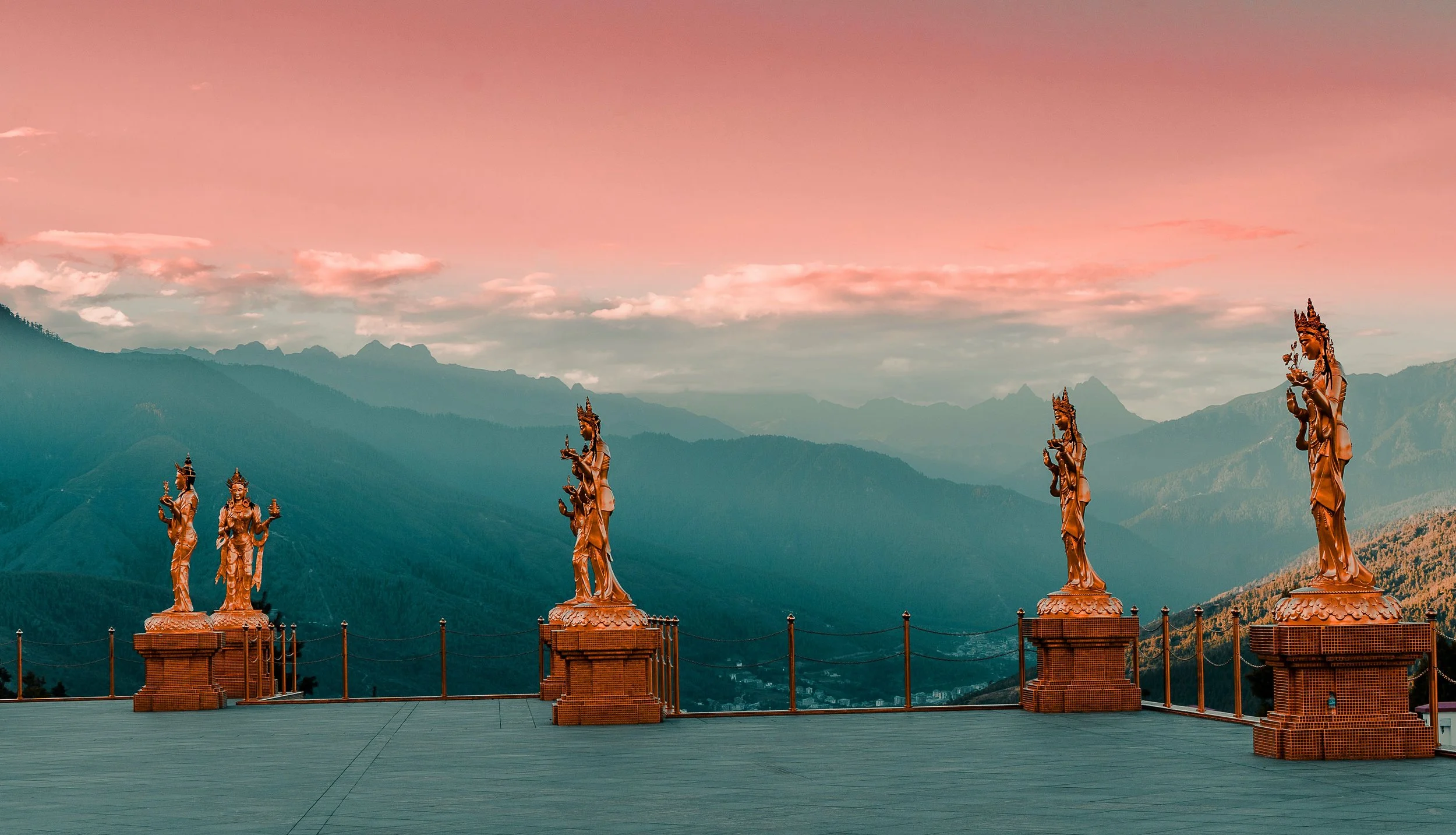In a travel-hungry world, it’s time to celebrate lesser-known treasures while prioritizing eco-consciousness, intimacy and crowd-free escapes.
Trekking through the Sossusvlei desert in Namibia. CC0
While the fame of places like Bali and Venice has led to overtourism, many troves of hidden treasures promise exciting experiences without the drawbacks and dangers of overcrowding. As wanderlust beckons, here are ten lesser-known spots that offer the perfect antidote to over-tourism and the best ways to keep these spaces protected.
1. Laos: Luang Prabang
Waterfall in Luang Prabang, Laos. note thanun CC0
Nestled amidst the lush landscapes of Laos, Luang Prabang is a UNESCO World Heritage site that whispers of a bygone era. Its ancient temples, including Wat Xieng Thong and Wat Mai, stand as testaments to a rich cultural history. The Alms Giving Ceremony, where monks collect morning donations, offers a profound glimpse into local customs. And be sure to engage in a cultural exchange by visiting the Traditional Arts and Ethnology Centre.
To experience Luang Prabang respectfully, opt for locally-owned guest houses like Le Sen Boutique Hotel. As you explore the town, meander through the vibrant Night Market, where handmade crafts and local delicacies are sure to tempt your senses. Savor traditional Lao cuisine at Tamarind Restaurant, which offers an authentic culinary experience.
2. Tbilisi, Georgia
A serene canal in Tbilisi, Georgia. Mad House. CC0
Tbilisi, Georgia's capital, unveils a captivating blend of history and modernity. Its charming old town, a labyrinth of cobblestone streets and historic buildings, begs to be explored. The scent of Georgian cuisine wafts from eateries like Shavi Lomi and Barbarestan, offering gastronomic delights. Don’t forget to visit family-run wineries like Pheasant's Tears for a bona fide Georgian viticultural experience.
To tread lightly on the environment, stay at eco-friendly accommodations such as Fabrika Hostel. And experience Georgian culture by participating in craft workshops at the G. Leonidze State Museum of Georgian Literature and Art, where traditional craftsmanship takes center stage.
3. Sao Miguel, Portugal
A lake view from the mountains of Sao Miguel, Portugal. Joao Louro. CC0
Sao Miguel, the largest island in the Azores archipelago, welcomes travelers to a realm of unspoiled nature. Explore lush landscapes in Sete Cidades and discover the tranquil beauty of volcanic lakes like Lagoa das Furnas. The island's cuisine showcases local seafood delicacies, with O Mercado being a notable dining destination.
For a genuine experience, consider staying in cozy guesthouses like Quinta Minuvida. Embark on eco-tours with Azores GreenMark to witness the unique flora and fauna that define Sao Miguel's natural beauty in Ribeira dos Caldeiroes.
4. Salalah, Oman
White sandy beaches in Salalah, Oman. Arisa S. CC0
Salalah, Oman's hidden oasis, lures conscious travelers in with its pristine beaches and rich cultural tapestry. Guided tours led by locals, such as Ahmed's Desert Safari, unveil the treasures of vibrant markets like Al Husn Souq. Culinary adventures await at Bin Ateeq, where traditional Omani flavors tantalize even the most cultured taste buds.
For ocean-loving travelers, participation in beach clean-up activities organized by Salalah Beach Conservation ensures minimal environmental impact and represents a great way to give back. Exploring the region's unique wildlife and pristine natural landscapes is a must, so consider a trip to Khawr Ruri Wetland Reserve.
5. Lalibela, Ethiopia
A stone house of worship in Lalibela, Ethiopia. mulugeta wolde. CC0
Lalibela, Ethiopia, stands as a cultural treasure trove, with its unique stone-hewn churches etched into the rock. Engage with local communities through guided tours like the Lalibela Eco Trekking tour, which fosters meaningful interactions and supports local initiatives. Ben Abeba Restaurant offers a taste of Ethiopian cuisine amid stunning panoramic views.
For an authentic experience, stay in locally-owned accommodations like Top Twelve Hotel. Exploring Lalibela's ancient sites, including the iconic Bete Giyorgis, is an unforgettable journey through Ethiopia's rich history.
6. Kotor, Montenegro
Path overlooking the river in Montenegro. Flo P. CC0
Kotor, Montenegro, offers a blend of natural wonder and cultural heritage perfect for sustainable travel. The breathtaking Lovćen National Park invites travelers to cycle or hike through panoramic landscapes, minimizing their carbon footprint. Dining at farm-to-table restaurants like Konoba Trpeza promises culinary delights—it’s the best way to experience the town's historic charm.
Engage with local artisans at Old Fisherman and attend cultural workshops at Bokelian Home to gain insight into the region's creative spirit. Exploring Kotor's Old Town and the stunning Bay of Kotor is a journey through Montenegro's timeless beauty.
7. El Nido, Philippines
Miniloc Island in El Nido. J Torres. CC0
El Nido, situated in Palawan, is a paradise of pristine beaches and vibrant marine life. Responsible diving and snorkeling tours, such as those by Submariner Diving Center, showcase the underwater wonders while prioritizing marine conservation. Supporting local initiatives like beach clean-ups and mangrove planting helps preserve Palawan's pristine beauty. There are also so many island hopping tours on offer, such as Tour C.
Savor fresh seafood at Artcafe or indulge in seafood buffets at Sea Cocoon Hotel. Beachfront accommodations, such as those offered by El Nido Resorts, provide a front-row seat to Palawan's idyllic beauty.
8. Samarkand, Uzbekistan
Beautiful temples of Samarkand, Uzbekistan. AXP Photography. CC0
Samarkand, Uzbekistan, is a city of soulful sights and rich traditions. Community-based tourism programs, like those offered by the Zerafshan Tourism Development Association, provide insight into local crafts and traditions. Staying in local homestays, including B&B Bahodir or Jahongir Guesthouse, contributes to the community's well-being.
Explore Samarkand sustainably on foot or by bicycle, both of which offer more opportunities for meaningful interactions with locals than car travel. Visits to historic sites like Registan Square and Shah-i-Zinda offer a glimpse into Central Asia’s rich cultural heritage.
9. Paro and Thimphu, Bhutan
Statues at Buddha Point in Thimphu, Bhutan. Passang Tobgay. CC0
Bhutan's Paro and Thimphu offer mystical vibes, cultural riches and an up-close look at Gross National Happiness in practice. Local festivals like Paro Tsechu immerse travelers in the country's unique traditions while staying in homestays, such as Sonam Trophel, and visiting Thimphu Dzong help support local livelihoods.
Eco-friendly hiking trails, including the renowned Tiger's Nest, allow for a respectful exploration of Bhutan's natural beauty. Try birdwatching in Phobjikha Valley, and be sure to adhere to the country's strict environmental regulations to ensure a harmonious journey through this otherworldly land.
10. Sossusvlei and Deadvlei, Namibia
Wildlife in the Sossusvlei desert in Namibia. Eric Ward. CC0
Preserving Namibia's fragile desert ecosystem requires responsible travel practices. Guided tours with experienced local guides, such as those with Tok Tokkie Trails, prioritize environmental education while allowing exploration of breathtaking desert landscapes. Staying in eco-friendly lodges like Desert Homestead Lodge and adhering to Leave No Trace principles ensure minimal environmental impact.
Cultural interactions with local communities inculcate an understanding of their way of life, fostering mutual respect. Witnessing the sunrise over the iconic dunes of Sossusvlei and Deadvlei will offer a profound connection to Namibia's untamed wilderness.
In a world awash with travel aspirations, these ten unappreciated treasures beckon with promises of authentic experiences and untouched beauty. By embracing sustainable and culturally immersive practices, travelers can ensure that exploring these destinations contributes positively to local communities, preserves natural environments and fosters meaningful connections.
Raeann Mason
Raeann is a traveler, digital storyteller, and guide writer, with a degree in Mass Communication & Media from the Walter Cronkite School of Journalism. She is passionate about a/effective journalism and cultural exchange, and is an advocate of international solidarity and people's liberation. Her work at CATALYST focuses on reshaping the culture of travel and hospitality to be more ethically sound and sustainable.












